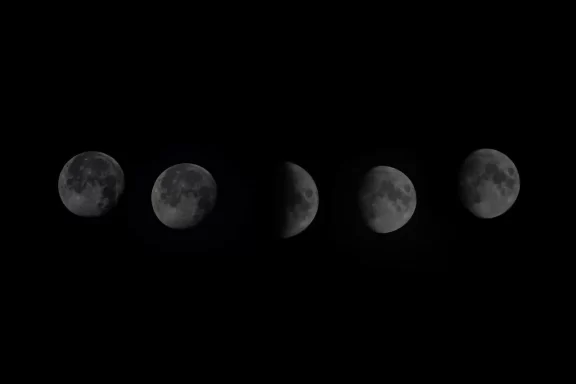Does random curiosity tend to creep up on you like it does me? If it does, you might have wondered how each day got its name. Most people don’t give too much thought to how they were named despite them being a part of our everyday lives. The weekday names have quite a story behind them that I find quite interesting because of their roots in ancient mythology, celestial beings, Asgardians and cultural influences, many of which you may be familiar with if you’ve ever watched a movie, read a book or are a fan of Marvel comic books and movies. Here are some interesting stories behind them.
Monday: The Artist Formerly Known as Moonday
No one likes Mondays. It serves as a reality check that last weekend is gone forever and it is the day when the work week begins for many people. It gets its name from the old English word “Monandæg”, which means “day of the moon”. This association with the moon dates back to ancient times when many cultures worshipped moon gods. For example, the Scandinavians dedicated Monday to the moon god Mani, who was believed to lead the moon in the night sky. The influence of these ancient beliefs is still in the name of this working day, which we still use today. With this information perhaps some moonlight will brighten up your Mondays.
For You, It Was the Most Important Day of Your Life. But for me, it was Tuesday
When someone says “God of War”, Kratos usually springs to mind, but Tuesday is named after the Norse god of war Týr, also known as Tiw. In Old English the day was called “Tiwesdæg”, meaning “day of Tiw”. Tiw was associated with courage, bravery and victory in battle, which in astrology coincides with the planet Mars. The Romans worshiped Mars, the god of war, and it is from the Latin ‘dies Martis’ that we get the modern name ‘Tuesday”.
Wednesday: Odin’s Day
Wednesday is a workday named after two important figures in ancient mythology. Old English speakers called it “Wōdnesdæg” after the Norse god Odin (or Woden), Thor’s dad, the guy with the eyepatch, and father of all men and ruler of the gods. Scandinavians associate Odin with wisdom, knowledge and poetry, however, the Romans dedicated Wednesday to the messenger god Mercury (Mercredi in French), known for his speed and agility. This merging of languages gives us the modern name “Wednesday”, coincidentally also the name of a very popular and morbid young lady.
Thursday: Tribute to Thor’s Thunder
The old Norse civilisation named Thursday after Thor (yes, the Avenger), the god of thunder and lightning. In Old English, it was called “Þūnresdæg”, meaning “Thor’s day” which in Afrikaans and Dutch is “Donderdag”, which directly translates to “Thunder Day”. Thor with his ability to yield the power of thunder and lightning thanks to Mjolnir, protected everyone from chaos and evil. So, its no surprise that his name and “thunder” were synonymous. Meanwhile, back in Rome, they had a similar idea so they called Thursday “dies Iovis,” or “Jupiter’s day” named after their own thunder god, Jupiter.
Friday is the Weekday of Love and Beauty Through Freyja
Friday is named after the Norse goddess Freyja (Frigg), associated with love, fertility, and beauty. In Old English, it was known as “Frīgedæg,” meaning “Frigg’s day.” The Norse revered Freyja as a powerful deity, with dominion over love, fertility, and the household. The Romans linked Friday to Venus, the goddess of love and beauty, giving us “dies Veneris” or “Venus’s day.” The similarities between Freyja and Venus underscore the universal themes of love and beauty celebrated on this day.
Saturday: Saturn Ascends
The Ancient Romans named Saturday, sometimes the last day of the week, after the god Saturn. In Old English, it was called “Sæternesdæg”, after the god of agriculture and time. At the time, the Romans often depicted Saturn with a sickle which symbolises a harvest, as he presided over the Golden Age of prosperity and abundance. The association of Saturday with Saturn endures in many languages, such as Spanish (“sábado”) and French (“samedi”), where the day remains tethered to the god of time and agriculture.
Sunday: The Weekday of Light and Life
Last but not least, we have Sunday, named after our sun which has inspired awe and reverence since the beginning of time. “Sunnandæg” as it was in Old English, translates to “Sun’s day”. Many cultures worshipped the sun in the ancient world, and as a symbol of light, warmth and life-giving energy, some still do. The Ancient Romans, quite fittingly, also associated Sunday with their sun god, Sol, giving rise to “Sun’s day”, or “dies Solis” as it is in Latin. For many, including myself, Sunday remains a day for relaxation and reflection. Some spend this day enjoying activities such as afternoon naps and spiritual practices while others enjoy the warmth and light of the sun by having family picnics or going to the beach. For some, me included, Sundays provide the perfect opportunity to hit the reset button. It’s a day you get to tidy up the cluttered desktop and gear up for the week ahead while savouring a little personal time we have just for ourselves.
Conclusion
In this fleeting life, with days flashing by us faster and faster the older we get, the names of the weekdays may seem mundane, but about their origins is one of those little nuggets that keep things interesting. With their roots in ancient myths, celestial bodies, and culture, they offer a window into the rich tapestry that is human history. From the loony Monday to the radiance of Sunday, each day carries a legacy of meaning and symbolism that continues to shape our lives today. So the next time you open your planner or glance at your calendar, I hope you will take a moment to appreciate the stories behind the names of the days of the week and marvel at the timeless connection between past and present.








No Comments